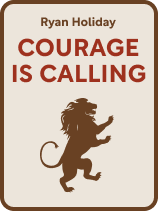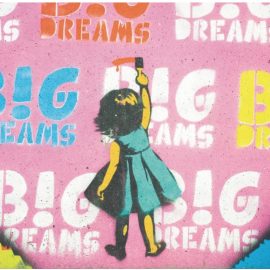

This article is an excerpt from the Shortform book guide to "Courage Is Calling" by Ryan Holiday. Shortform has the world's best summaries and analyses of books you should be reading.
Like this article? Sign up for a free trial here.
Do you actually believe that you can make a difference? Is confidence holding you back from acting in significant ways?
Part of being courageous is following your own path and speaking up for what you believe in, even in the face of extreme opposition. Ryan Holiday argues that we must all recognize our agency and make courageous action our responsibility.
Keep reading to learn why it’s important to have faith in yourself if you want to make a difference.
Have Faith in Yourself
According to Holiday, the first step toward making a positive difference is believing that you can do so; you must have faith in yourself. This belief in your own agency allows you to make brave choices that lead to bigger changes. This kind of bravery doesn’t just happen in situations where your life and livelihood are at risk—it’s also in the small choices you make every day.
(Shortform note: You can make brave choices every day by doing things that take you out of your comfort zone. As we’ve noted, when you establish a pattern of brave actions, you prepare yourself for moments when a higher form of courage is needed. One way to exercise everyday courage in your life is learning the power of the word “no.” Too often, we’re taught that saying “no” is selfish or inconsiderate. We end up doing things we don’t want to do because we’re afraid to lose social acceptance. Saying “no” to things you don’t agree with, like going to a work meeting after hours when you’re supposed to be spending time with family, helps you set healthy boundaries and increases your self-esteem and confidence.)
Once you start making courageous decisions, Holiday argues that you’ll inspire others to be brave as well. Only one person has to be courageous to change the minds of others. Instead of condemning others for being cowardly, be the example that shows them how things could be better. Inspiring others creates a snowball effect, leading to change on a wider scale.
Take American teachers, for example. Along with teaching and caring for their students, many of them face funding cuts, low salaries, student poverty, unsupportive administrations, and restrictive legislation, all of which make it more difficult for them to do their jobs. Despite this, many teachers stay in their jobs because they believe that they can make a difference in their students’ lives. They do make a difference, even if it’s on the individual level—good teachers give their students a chance to flourish and grow into more discerning, more confident, more courageous people.
(Shortform note: Anyone can inspire courage in others, but it’s especially important that leaders create a culture of courage for the people under them. Allow your people to make mistakes so they have chances to grow, learn, and innovate. When they display courage and take risks, offer them rewards. When things don’t go well, offer them support and emphasize the importance of effort. Additionally, give them a motivating reason to act courageously by helping them connect with your mission on a personal level. This reason might be different for everybody, and it’s a leader’s job to figure out what motivates each member of their team. Finally, lead by example by taking risks and showing them that you’re not perfect either.)

———End of Preview———
Like what you just read? Read the rest of the world's best book summary and analysis of Ryan Holiday's "Courage Is Calling" at Shortform.
Here's what you'll find in our full Courage Is Calling summary:
- Ryan Holiday's advice for how to be courageous in any situation
- How to break free from the fear of what other people think of you
- How to take control of your actions and make difficult decisions






